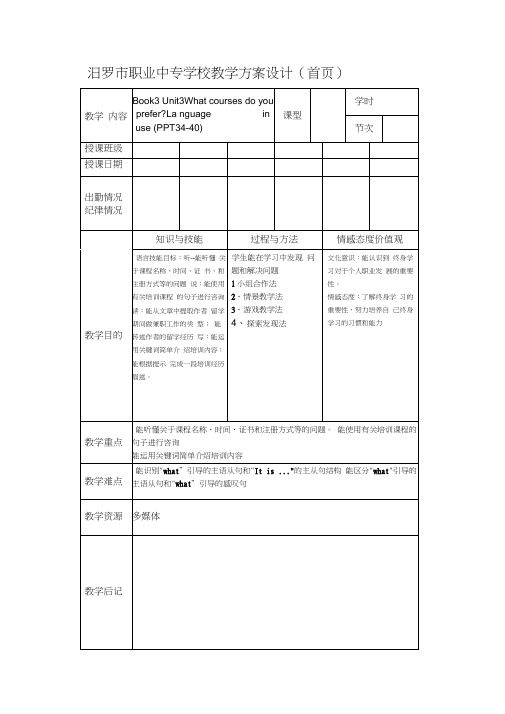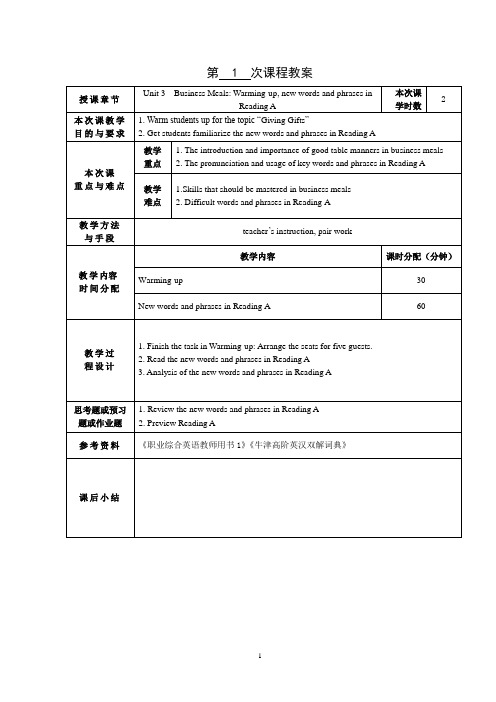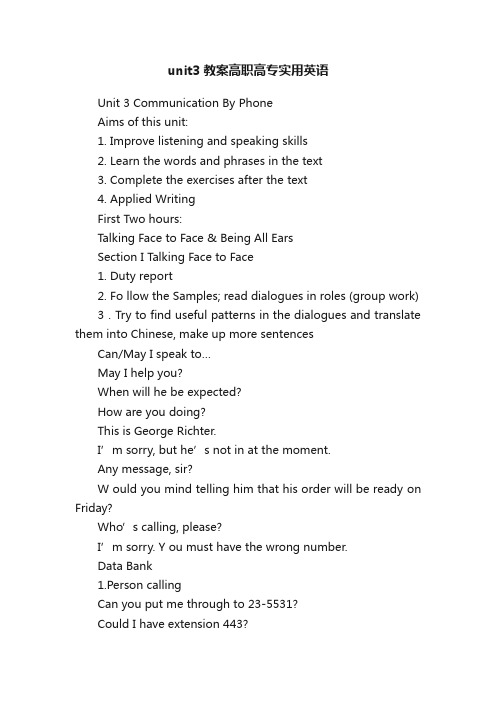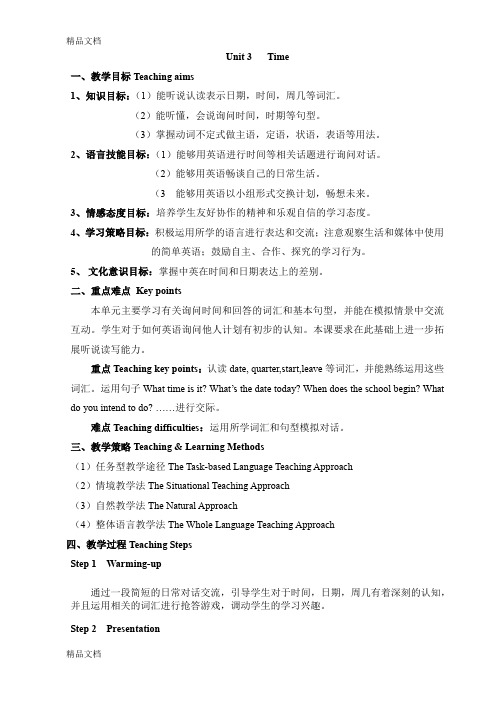高职高专英语第三单元教案
职业高中英语第三册第三单元语法部分教案unit3languageinuse

汨罗市职业中专学校教学方案设计(首页)从属连词:that ; whether连接代词:what( whatever) ; whose ;whom ; who( whoever);which (whichever)连接畐【J词:when ;where;how ;why.1) 从属连词:that, whether引导主语从句只起引导作用,在主语从句中不充当任何成分,that本身无实际意义,但不能省略.whether意为是否”放在句首句末皆可。
Eg:That price will go up is certain.That he will come is certa in.Whether we go by train or by boat makes nodiffere nee.Whether he' II come here isn' t clear.2) 连接代词who ( whoever) , what (whatever ),which (whichever), whom, whose .Eg: Which side will win is not clear.Who will write the poem has not bee n decided yet.Whatever he did is right.Who killed the scie ntist rema ins a questi on.Whom she borrowed money from still puzzled him.3) 连接畐U词when,where,how,why 等。
Eg: How this happened is not clear to anyone.Whe n he will be back depe nds on the weather.Whe n we' ll start tomorrow will be told soon.Where the test will be give n is not yet decided.2.主语从句后置!。
职业英语unit 3教案

第 1 次课程教案●Period 11. Warming-upTask: Complete the following table seating arrangement.Step1: What are the principles of seating arrangement?1.Seat people who have common interests together.2.Pair male and female guests.3.Seat guests of honor in order. The most important person should be seated at the right hand ofthe host.Step2: Ask Ss to match the guest names to seats A-E.Step3: Ask some Ss to give their answers and explain them to the class.Step4: Comment briefly on their work and give the suggested answers.●Period 22. New words and phrases in Reading AStep1: Read the new words and phrases in Reading AStep2: Analysis of the new words and phrases in Reading A1) entertain v. 招待;给…娱乐e.g. entertain friends at dinner 招待朋友吃饭A teacher should entertain as well as teach. 教师不仅要教书,也要能引起学生兴趣。
相关派生词: entertaining a. 使人愉快的,有趣的an entertaining story 一个有趣的故事entertainment n. 招待,娱乐A cinema is a place of entertainment. 电影院是公众娱乐场所。
中职英语教案:Unit 3 Artificial Intelligence(全6课时)

Task—basedTeaching Method. Situational learning.
教学设备
Multi-media
教学
环节
教学活动内容及组织过程
个案补充
教
学
内
容
Step 1: warm-up
1.Brainstorm.
T: Let's share the pictures and videos prepared by the students before class
教学
目标
1.understand the key information about AI and summarize the topic.
2.identify the language which expressing pros and cons in the
dialogue.
重点
To master the important words &phrases.Readthe words correctly.
S:Five students in our group have used
教
学
内
容
mobile payment......No students have experienced robots putting car parts together......
1.Have you ever seen robots putting car parts together?
•tour
•assembly
•line
assembly line n.
3. Listen and complete.
unit3教案高职高专实用英语

unit3教案高职高专实用英语Unit 3 Communication By PhoneAims of this unit:1. Improve listening and speaking skills2. Learn the words and phrases in the text3. Complete the exercises after the text4. Applied WritingFirst Two hours:Talking Face to Face & Being All EarsSection I Talking Face to Face1. Duty report2. Fo llow the Samples; read dialogues in roles (group work)3.Try to find useful patterns in the dialogues and translate them into Chinese, make up more sentencesCan/May I speak to…May I help you?When will he be expected?How are you doing?This is George Richter.I’m sorry, but he’s not in at the moment.Any message, sir?W ould you mind telling him that his order will be ready on Friday?Who’s calling, please?I’m sorry. Y ou must have the wrong number.Data Bank1.Person callingCan you put me through to 23-5531?Could I have extension 443?Could you tell me the number of t he English Department?Hello, this is Jack Simpson.Good morning/afternoon. Jack Simpson speaking.Can/May I speak to Jack Simpson?Let me talk to Jack Simpson.I’d like to speak to Jack Simpson if I may.I would like to talk to Jack Simpson.When is he expected to be back?What time could I reach her?Can I contact him this evening?What if I call tomorrow around nine?Could you ask her to call me back?Please have him return my call.Please tell him to phone 77-8961, Jack Simpson. Would you tell her I called?I must have dialed the wrong number.Sorry, I must have got the wrong area code. Sorry to have trouble you.2.Person calledA moment, please. I’ll connect you.Just a minute. I’ll get the number for you.One moment. I’ll switch you over.The line is busy.Hello, this is Jack Simpson here. Who's speaking? May I have your name?I’m afraid he isn’t in at the moment.He’s on another phone.Hold the line. I’ll see if he’s in.Sorry, he is at a meeting now.Y ou can call again one hour later.In half an hour, I guess.Sorry, he won’t be here this evening.Sorry, he’s not available till tomorrow afternoon. Could I take a message for you?Do you want to leave a message?Is there any message I can give him?Do you want to leave word for him to call you? I’m sorry, it’s a wring number.No, this isn’t the number you want.Sorry, the number’s changed.I’d like service for my new apartment.To/For 交From 留言人Of 留言人单位名称Date 留言日期Time 留言时间Phone 留言人电话Area code 区号Extension 分机号Telephone number 电话号Telephoned/called 来过电话Please call 请打电话(给)Will call again 将再来电话Returned call 已回电话Will telephone later 过后回来电话Will return 将回电话Came to see you 来过,要见您Wants to see you 想拜访您Urgent 紧急电话Important 重要电话Was in 留言人在Message 留言内容Signed 签字Remarks 备注4. Act outDivide Students into two groups; finish the first task together Isn’t it supposed to be very warm tomorrow?In that case, going skiing wouldn't be a very good idea.Let’s wait and see what the weather will be like tomorrow.Divide students into four groups. Two students in a team imitate the dialogue to finish their own task. After 3-minute practice, choose them freely and give scores 5. Put in Use For the first question, let Group One finish it individually. Every student in other two teams read the rest of the dialogue.For Question Two, one sentence for one pair in Group Two. Check the answers together, find a representative.The same is true with the third one after checking the answers; teacher chooses two teams to act it out.Second Two hours:Section III Passage I For Conversation Press #1I.Review:1.Students act out their own dialogue.2.Dictation of words of last UnitII.Leading-in:Free talk about:How many of your have cell phones?What do you often do with your mobile phone?Have you ever used you mobile phone in class?Talk about your feeling of using cell phone.Introduction of the background information1. a cell phoneA cell phone is a small telephone you can carry with you that operates through networks of radio antennas or space satellites. other expressions of a cell phone:a cellular phonea mobile phonea handset2. ATMATM is the abbreviation for automated teller machine. ATMs are found in business districts and shopping malls. People use them to get cash from their bank accounts and in many places, to pay for gas, groceries, and other things.III. New Text1.New W ordspreferable: a.e.g.: Coffee is preferable to tea, I think.我认为咖啡比茶更好.Gradual change is preferable to sudden, great change.cf: preferI prefer coffee to tea.I prefer to swim in the hot summer afternoon.connect: v.e.g.: Will you connect this wire to the television.你把这根电线和电视机连上好吗?"If it is built, it will connect Britain to Europe for the first time in history.""如果隧道建成,它将有史以来第一次把英国和欧洲大陆连接起来。
(完整word版)Unit3教学设计

浙江省中等职业学校课本《英语》第一册(浙江省教育厅职成教教研室编)Unit 3 School LifeSection C Reading教学设计The Lesson design on ReadingUnit 3 Section C, BookⅠ学情分析本班学生学习英语具有以下特点:1、学习英语动力不足,只停留在感官认识上——主要表现在喜欢接触新鲜英语材料,如图片,音像资料等,但是落实到学习实处时动力不足;2、只会简单操练,课堂会话欠加强——主要表现在对不同话题只会简单机械模仿,自由会话明显不够,小组讨论有待加强;3、学习目标明确但能力存在障碍——主要表现在希望通过出色的表现来实现被尊重的自我需求,但是学习基础低下、学习方式落后。
具体到本课时,同学们已经掌握谈论最喜欢的课程和最喜欢的校园活动这两个句型并能模仿操练;但对阅读方法掌握不够,影响阅读速度和质量。
教材分析本单元是浙江省中等职业学校英语第一册的第三单元,单元主题是“School Life”。
本课时为Section C的第一课时,仍延续“School Life”这个话题并加以延伸,是一节阅读课。
阅读是组成英语课程资源的基本要素。
Section C主要通过四个小标题:Courses、School Activities 、Friend 、Jobs,勾勒出本单元的话题,引出阅读文章“American high school life”,让学生了解美国学生高中生活。
通过略读、查读、精读和小组讨论等形式,让学生对课文的内容有所了解,并一起讨论中美高中生活的异同之处,同时培养学生的阅读技巧和方法,从而提升他们的阅读能力。
教学目标通过本节课的学习,学生们将会学习到:1、知识目标(1)正确朗读新单词yearly, prom, celebration, babysit, lawn,并掌握skill, include, through, social, education, besides, offer等四会单词。
职业高中英语第三册第三单元语法部分教案unit3languageinuse

职业高中英语第三册第三单元语法部分教案unit3languageinuse汨罗市职业中专学校教学方案设计(首页)教学内容Book3 Unit3What courses doyou prefer?Language inuse (PPT34-40)课型学时节次授课班级授课日期出勤情况纪律情况教学目的知识与技能过程与方法情感态度价值观语言技能目标:听--能听懂关于课程名称、时间、证书、和注册方式等的问题说:能使用有关培训课程的句子进行咨询读:能从文章中提取作者留学期间做兼职工作的类型;能转述作者的留学经历写:能运用关键词简单介绍培训内容;能根据提示完成一段培训经历描述。
学生能在学习中发现问题和解决问题1、小组合作法2、情景教学法3、游戏教学法4、探索发现法文化意识:能认识到终身学习对于个人职业发展的重要性。
情感态度:了解终身学习的重要性,努力培养自己终身学习的习惯和能力教学重点能听懂关于课程名称、时间、证书和注册方式等的问题。
能使用有关培训课程的句子进行咨询能运用关键词简单介绍培训内容教学难点能识别“what”引导的主语从句和“It is ...”的主从句结构能区分“what”引导的主语从句和“what”引导的感叹句教学资源多媒体教学后记Step 1 Review1.默写上节课所学习的单词。
2.学生背诵Everyday English。
3.学生自己朗读activity 14的作文。
Step 2Lead-inGrammar focus:What I want to learn is something new about computer programming.It is good news to me that I can register online.It impressed me that many Australian students earn their tuition fees through part-time employment.1.学生自己阅读例句。
最新中职英语Unit-3-教案-time

Unit 3 Time一、教学目标Teaching aims1、知识目标:(1)能听说认读表示日期,时间,周几等词汇。
(2)能听懂,会说询问时间,时期等句型。
(3)掌握动词不定式做主语,定语,状语,表语等用法。
2、语言技能目标:(1)能够用英语进行时间等相关话题进行询问对话。
(2)能够用英语畅谈自己的日常生活。
(3 能够用英语以小组形式交换计划,畅想未来。
3、情感态度目标:培养学生友好协作的精神和乐观自信的学习态度。
4、学习策略目标:积极运用所学的语言进行表达和交流;注意观察生活和媒体中使用的简单英语;鼓励自主、合作、探究的学习行为。
5、文化意识目标:掌握中英在时间和日期表达上的差别。
二、重点难点Key points本单元主要学习有关询问时间和回答的词汇和基本句型,并能在模拟情景中交流互动。
学生对于如何英语询问他人计划有初步的认知。
本课要求在此基础上进一步拓展听说读写能力。
重点Teaching key points:认读date, quarter,start,leave等词汇,并能熟练运用这些词汇。
运用句子What time is it? What’s the date today? When does the school begin? What do you intend to do? ……进行交际。
难点Teaching difficulties:运用所学词汇和句型模拟对话。
三、教学策略Teaching & Learning Methods(1)任务型教学途径The Task-based Language Teaching Approach(2)情境教学法The Situational Teaching Approach(3)自然教学法The Natural Approach(4)整体语言教学法The Whole Language Teaching Approach四、教学过程Teaching StepsStep 1 Warming-up通过一段简短的日常对话交流,引导学生对于时间,日期,周几有着深刻的认知,并且运用相关的词汇进行抢答游戏,调动学生的学习兴趣。
高职高专英语说课稿

高职高专英语说课稿Unit 3 Passenge One I Hate Flying各位专家,老师,大家好!我今天说课的题目是《大学英语1 》第三单元I Hate Flying。
下面我将从教学目标和教学实现分上、下两篇进行阐述。
一教学目标1 .1学情分析《大学英语1》开设在非英语各专业大学第一学期,此时学生正处于从高中英语向专业英语学习的过渡阶段,还没有完全摆脱高中应试教育的学习模式。
为了更好地了解学生英语学习的现状,我们对大英的学生展开了问卷调查,调查显示大部分学生表示对英语学习感兴趣,认为英语对其专业课程学习和将来的工作有帮助;但也有不少学生认为自己英语基础不好,对于怎样学好该门课程没有足够的信心。
鉴于高职学生目前这种现状,《大学英语》课程在实现人才培养目标中处于怎样的地位呢?下面我们来看看本课程的定位。
1.2本课程的定位高职高专院校肩负着为社会培养各种应用型技术人才的重任,大部分学生毕业后将从事电子、文秘、社工等工作,《大学英语》课程作为一门公共基础课,主要任务是培养学生听、说、读、写、译等方面的综合能力,为其专业课程学习、乃及今后的实际工作打下良好的语言基础。
由此看来该门课程主要起着工具的作用,具有一定的通用性和可持续发展性。
1.3教材分析该门课程选用的是由高等教育出版社出版的《新编实用英语综合教程》系列教材,该教材以“应用为目的,实用为主,够用为度”,注重学生应用能力和实用能力的培养。
《新编实用英语综合教程1 》一共分为十个单元,每一单元都以特定的话题为主题,通过Talking Face to Face, Being All Ears, Maintaining a Sharp Eye以及Trying Your Hand 4个环节共6个学时的教学展开了听、说、读、写、译等各项技能的培养与训练,并通过 Having Some Fun这一趣味阅读来培养学生的文化欣赏能力。
今天我所的是第三单元第3、4课时Passage One I Hate Flying这一内容,本堂课是建立在听说课的基础上,为第5、6课时的语法和写作打基础。
- 1、下载文档前请自行甄别文档内容的完整性,平台不提供额外的编辑、内容补充、找答案等附加服务。
- 2、"仅部分预览"的文档,不可在线预览部分如存在完整性等问题,可反馈申请退款(可完整预览的文档不适用该条件!)。
- 3、如文档侵犯您的权益,请联系客服反馈,我们会尽快为您处理(人工客服工作时间:9:00-18:30)。
Unit3 I want to further my study abroadThe First PeriodTeaching aims:Get the Ss be able to read the new words in Dialogue A and Dialogue B.Important points:Get the Ss master the some important words and phrases in Dialogue A and Dialogue B.Difficult points:Make sure that the Ss can use the useful expressions in Dialogue A and Dialogue B. Teaching aids: Tape recorderTeaching methods: Explaining; Practicing and actingTeaching procedures:Step 1 GreetingGreet students as usual.Step 2 Lead inAsk the Ss some words about furthering study abroad.Step 3 ListeningPlay the tape of the new words in dialogue A and Dialogue B for the Ss .Step 4 Reading aloudPlay the tape again and ask the Ss to pay attention to the pronunciation and intonation. Then divide them into two parts and get them read the new words together. After reading, explain some important words and useful expressions to the Ss.Step 5 ExplanationExplain the important words and expressions to the Ss.Step 6 ConsolidationRecall the important words, phrases and useful expressions learned in this period with the Ss together to give them a deep impression.HomeworkRecite the the new words in Dialogue A and Dialogue B.The Second PeriodTeaching aims:Get the Ss be able to read the Dialogue A fluently and to recite the useful expressions, as well to make simple dialogues by using these expressions.Important points:Help the Ss grasp the some important useful expressions about further study abroad and make sure that they are able to use them in their communication.Difficult points:Make sure that the Ss can use the useful expressions in their communication and can make their own dialogues..Teaching aids: Tape recorderTeaching methods: Explaining; Practicing and actingTeaching procedures:Step 1 RevisionRevise some useful expressions of further study abroad with the Ss together by making a small talk.Step 2 Lead inAsk the Ss how they would say if they want to further study abroad. Give them two minutes to talk about it and then ask some of them to give their opinions. After this activity, lead in the topic of this unit: Further study abroad.Step 3 ListeningPlay the tape of the dialogue A for the Ss and then ask them to try to check their understanding by doing the first four exercises in Exercise 1 . After they finish doing it, ask one of them to give her answers and then check the answers with them together.Step 4 Reading aloudPlay the tape again and ask the Ss to pay attention to the pronunciation and intonation. Then divide them into two parts and get them read the dialogue together. After reading, explain some important words and useful expressions to the Ss.Step 5 ExplanationExplain the important words and expressions to the Ss.Step 6 PracticeGive the Ss several minutes to prepare for a dialogue imitating the dialogue learned in this period and try to use the useful expressions, then ask one or two pair to perform their own dialogues.Step 8 ConsolidationRecall the important words, phrases and useful expressions learned in this period with the Ss together to give them a deep impression.HomeworkRecite the dialogue after class and preview the next one.The Third PeriodTeaching aims:Get the Ss be able to read the Dialogue B fluently and to recite the useful expressions, as well to make simple dialogues by using these expressions.Important points:Help the Ss grasp the some important useful expressions about further study abroad and make sure that they are able to use them in their communication.Difficult points:Make sure that the Ss can use the useful expressions in their communication and can make their own dialogues..Teaching aids: Tape recorderTeaching methods: Explaining; Practicing and actingTeaching procedures:Step 1 RevisionRevise some useful expressions of resume with the Ss together by making a small talk.Step 2 Lead inAsk the Ss how they would say if they want to further study abroad. Give them two minutes to talk about it and then ask some of them to give their opinions. After this activity, lead in the topic of this unit: further study abroad.Step 3 ListeningPlay the tape of the dialogue B for the Ss and then ask them to try to check their understanding by doing the last four exercises in Exercise 1 . After they finish doing it, ask one of them to give her answers and then check the answers with them together. Step 4 Reading aloudPlay the tape again and ask the Ss to pay attention to the pronunciation and intonation. Then divide them into two parts and get them read the dialogue together. After reading, explain some important words and useful expressions to the Ss.Step 5 ExplanationExplain the important words and expressions to the Ss.Step 6 PracticeGive the Ss several minutes to prepare for a dialogue imitating the dialogue learned in this period and try to use the useful expressions, then ask one or two pair to perform their own dialogues.Step 8 ConsolidationRecall the important words, phrases and useful expressions learned in this period with the Ss together to give them a deep impression.HomeworkRecite the dialogue after class and preview the next one..The Fourth PeriodTeaching aims:Get the Ss be able to read the new words in passage A and passage B.Important points:Get the Ss master the some important words and phrases in passage A and passage B. Difficult points:Make sure that the Ss can use the useful expressions in passage A and passage B. Teaching aids: Tape recorderTeaching methods: Explaining; Practicing and actingTeaching procedures:Step 1 GreetingGreet students as usual.Step 2 Lead inAsk the Ss some words about further study abroad.Step 3 ListeningPlay the tape of the new words in passage A and passage B for the Ss .Step 4 Reading aloudPlay the tape again and ask the Ss to pay attention to the pronunciation and intonation. Then divide them into two parts and get them read the new words together. After reading, explain some important words and useful expressions to the Ss.Step 5 ExplanationExplain the important words and expressions to the Ss.Step 6 ConsolidationRecall the important words, phrases and useful expressions learned in this period with the Ss together to give them a deep impression.HomeworkRecite the the new words in passage A and passage B.The fifth periodTeaching aims:1.Get the Ss be able to understand passageA thoroughly and master some useful phrases and words, as well sentences patterns.2. Help the Ss to master some information about furthering study abroad through learning passageA in this unit.Important points:1.Get the Ss master some important words and phrases.2.Help the Ss to master some information about furthering study abroad through learning passageA in this unit.Difficult points:Help the Ss to master some information about furthering study abroad through learning passageA in this unit.Teaching aids: Tape recorderTeaching methods: Explaining; PracticingTeaching procedures:Step 1 RevisionCheck the homework given last period.Step 2 Lead inAsk the Ss how much they know about some information about furthering study abroad . Talk about it if possible then lead in the passage: An au pair girl.Step 3 ListeningPlay the tape of the passage for the Ss and then ask them to try to check theirunderstanding by doing the Exercise 2. After they finish doing it, ask one of them to give her answers and then check the answers with them together.Step 4 Reading aloudPlay the tape again and ask the Ss to pay attention to the pronunciation and intonation. Then give them three minutes to read it, and ask some to read it aloud after preparation. Correct the pronunciation if necessary. After reading, explain some important words and useful expressions to the Ss.Step 5 ExplanationExplain the important words and expressions to the Ss.Step 6 ConsolidationGive the Ss several minutes to prepare for retelling the content of this passage in order to consolidate the understanding of this passage.HomeworkRevise the Passage after class and do the exercises in this part in the book, as well prepare for passage B.The Sixth PeriodTeaching aims:1.Get the Ss be able to understand passageB thoroughly and master some useful phrases and words, as well sentences patterns.2. Help the Ss to master some information about office hour through learning passageB in this unit.Important points:1.Get the Ss master some important words and phrases.2.Help the Ss to master some information about office hour through learning passageB in this unit.Difficult points:Help the Ss to master some information about office hour through learning passageB in this unit.Teaching aids: Tape recorderTeaching methods: Explaining; PracticingTeaching procedures:Step 1 RevisionCheck the homework given last period.Step 2 Lead inAsk the Ss how much they know aboutoffice hour . Talk about it if possible then lead in the passage: office hourStep 3 ListeningPlay the tape of the passage for the Ss and then ask them to try to check their understanding by doing the Exercise 4. After they finish doing it, ask one of them to give her answers and then check the answers with them together.Step 4 Reading aloudPlay the tape again and ask the Ss to pay attention to the pronunciation and intonation. Then give them three minutes to read it, and ask some to read it aloud after preparation. Correct the pronunciation if necessary. After reading, explain some important words and useful expressions to the Ss.Step 5 ExplanationExplain the important words and expressions to the Ss.Step 6 ConsolidationGive the Ss several minutes to prepare for retelling the content of this passage in order to consolidate the understanding of this passage.HomeworkRevise the Passage after class and do the exercises in this part in the book, as well prepare for Grammar.The Seventh PeriodTeaching aims:1. Get the Ss master the Grammar: 现在完成时和一般过去时的区别2. Do the exercises to revise what we have learned in this unit.Important points and Difficult points:Get the Ss master the Grammar: 现在完成时和一般过去时的区别Teaching methods: Explaining; PracticingTeaching procedures:Step 1 RevisionCheck the homework given last period.Step 2 Lead inAsk the Ss to translate the following Chinese sentences into English.我已经看过这本书了。
